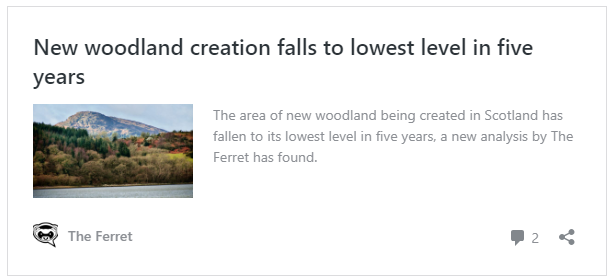The Scottish Government’s investment bank gave £50m to a forestry scheme that has now been bought out by a New York finance giant – sparking claims the bank is failing to support Scotland’s economy and obstructing land reform efforts.
The Scottish National Investment Bank (SNIB) agreed a five-year, £50m investment in a forestry fund managed by London investment company Gresham House in 2021.
Gresham House – already one of the largest private owners of Scotland’s forests – was taken over by Manhattan-based private equity firm Searchlight Capital in December.
The forestry fund will buy parts of existing forests as well as new land for planting trees, mostly in Scotland, and will make money for investors through the sale of timber and carbon credits.
SNIB and Gresham House claim the scheme will have environmental benefits including capturing over one million tonnes of climate-polluting carbon dioxide over 20 years. They also say it will create jobs in rural Scotland.
But there are concerns the fund will contribute to growing competition for rural land, driving up its price and preventing communities taking ownership of local forests.
Campaigners said SNIB’s investment in the fund and its takeover by Searchlight raised “concerning questions” about the use of public money in “furthering the concentration of landownership in Scotland” including into the hands of the “privileged few”.
Providing money for funds run by New York based firms is “far removed” from the initial aims of SNIB, one Labour MSP argued.
SNIB told The Ferret that the buyout of Gresham House “will not compromise the benefits that will come to Scotland”. Investment in the fund was “aligned with the bank’s missions and remit”, a spokesperson said.
Scotland already has a noted problem of foreign ownership in our economy. SNIB was supposed to be an institution that reversed rather than encouraged this trend.
Craig Dalzell, Common Weal
Land prices in rural Scotland are already spiralling as investors scramble to make money from lucrative markets in timber and carbon credits.
Communities who want to own local forests – and benefit from the financial opportunities they bring – are struggling to compete with these investors when land comes to market. SNIB’s investment in the Gresham House fund could be encouraging this dynamic, and running counter to Scottish Government plans to reform land ownership, campaigners fear.
When it launched in 2020, then-first minister Nicola Sturgeon said SNIB would deliver “economic, social and environmental returns” for the people of Scotland.
It describes itself as a ‘development bank’ which invests in Scottish business, projects and communities. SNIB is “operationally independent” of the Scottish Government but is owned by, and accountable to, ministers.
The Scottish Government has targets to ramp up woodland creation in Scotland to help meet climate targets and to increase the amount of the country covered by forest from 19 per cent now to 21 per cent by 2032.
But there are concerns that it will be left to the private sector to deliver these ambitions with communities and local people frozen out of the financial benefits of owning forestry.

An expert report published in November 2023 found that ownership of Scotland’s forests is becoming increasingly dominated by estates, investors and absentee owners who live outside Scotland. This is despite the Scottish Government’s apparent emphasis on land reform.
This is a problem, the report claimed, because forests owned by those who do not have a stake in the local area may not consult residents on decisions that affect them.
Dr Josh Doble, a policy manager at Community Land Scotland, argued the takeover of Gresham House by Searchlight was evidence of the “dire need for land reform which delivers meaningful regulation of Scotland’s land market”.
“This deal raises concerning questions about the use of public money in furthering the concentration of landownership in Scotland and runs counter to the Scottish Government’s commitment to land reform,” Doble told The Ferret.
His view was echoed by Craig Dalzell, head of policy and research at the Common Weal think tank.
“Scotland already has a noted problem of foreign ownership in our economy – a problem that already leads to many billions of pounds leaving Scotland each year in the form of extracted profits,” he claimed. “SNIB was supposed to be an institution that reversed rather than encouraged this trend.”
Dalzell argued that the Gresham House deal could raise “barriers” for land reform in “favour of harvesting Scottish land for ‘tax efficient’ profits”. Gresham House’s website notes that forestry is a “tax efficient” investment, with the “majority of income” that an investor receives from a forestry fund “anticipated to be free of tax”.
As well as SNIB, other investors in the forestry fund include pension schemes and wealthy individuals.
SNIB should be investing in local communities, not concentrating more of Scotland’s land ownership in the hands of the privileged few.
Monica Lennon MSP, Scottish Labour
Scottish Labour MSP Monica Lennon said: “Along with many others I have quizzed SNP and Scottish Green ministers on whether this is a good and proper use of SNIB money. Benefitting New York based firms is far removed from the vision behind the SNIB.
“SNIB should be investing in local communities, not concentrating more of Scotland’s land ownership in the hands of the privileged few.”
A SNIB spokesperson said the Gresham House investment will deliver environmental benefits including absorbing carbon, flood defence and improving air quality. They said there would also be “additional job creation in rural communities”.
“This is aligned with the bank’s missions and remit. The ultimate owner of the manager of the fund will not compromise the benefits that will come to Scotland,” the spokesperson said.
They added: “We seek to work alongside private sector capital where possible to deliver the scale of investment required to support innovative businesses and projects that are contributing to key priorities.”
Gresham House and the Scottish Government declined to comment.
Main image: conn75/iStock















So SNIB fork out a cool £50m to some financiers who sell on to some other money-men who no doubt see the opportunity to get planting grants from SG in future while selling carbon credits, in a market which Ministers have still no clue how to regulate. So poor. We’re like a 3rd world country selling off our resources to all and sundry. When is it going to stop?